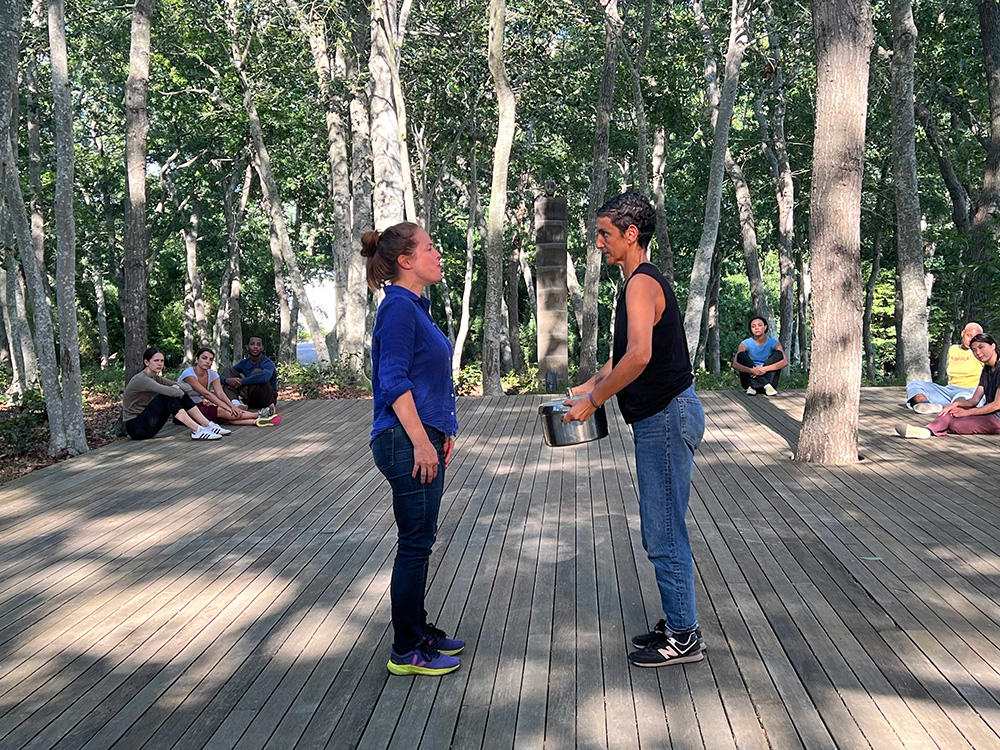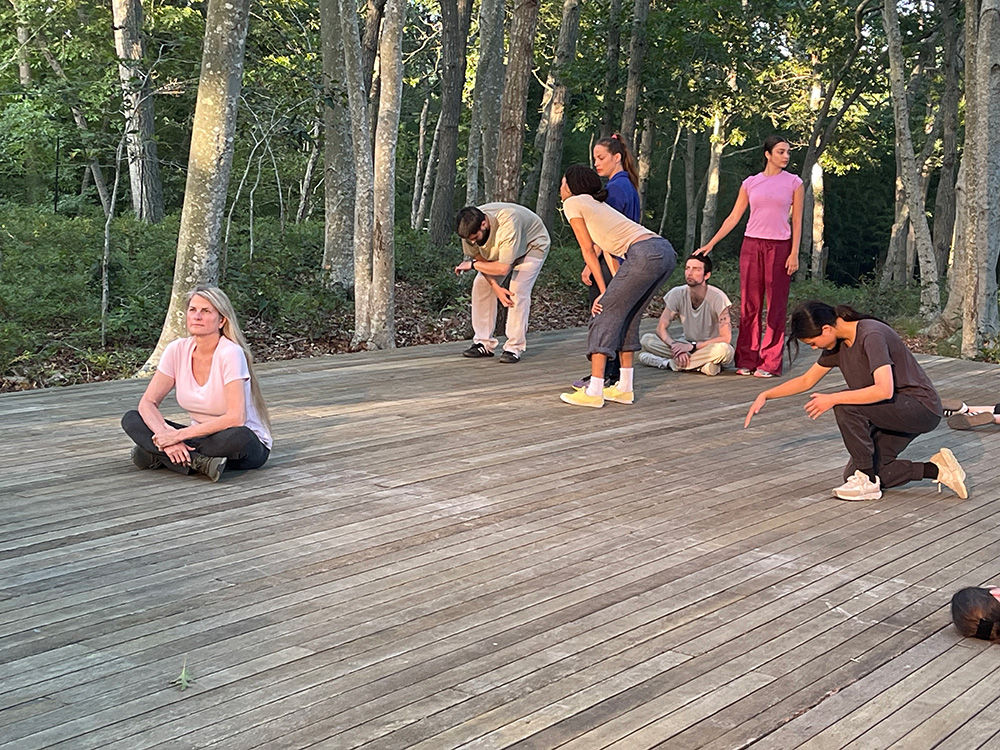World-renowned conceptual artist Simone Forti was honored at the 2023 Annual Watermill Center Gala. Ms. Forti watched by livestream as four of her iconic works were restaged by Sarah Swenson at the benefit. Each year Robert Wilson’s Watermill Center recognizes artists for their prestigious contributions to the international art world. Born in 1935, Simone Forti is a dancer/choreographer/artist/writer based in Los Angeles. Ms. Forti’s work has been influential in both the fields of dance and visual arts.
The Watermill Center Annual Summer Benefit celebrates art and experimentation to support the organization’s year-round programming. Featuring dynamic works by a roster of groundbreaking international artists, the evening invites guests to immerse themselves in a curated series of installations and performances across The Watermill Center’s expansive property. This year’s gala, “the BODY,” was presented by Van Cleef & Arpels, with generous additional support provided by PFRANKMD by Dr. Paul Jarrod Frank, Prada, Aperol, and Campari America. Stemming from The Watermill Center’s 30+ year association with performance, the 2023 Annual Summer Benefit centered on the body’s role in art making. “the BODY” was a broad approach engendered by diverse cultures and mediums, including time-based performance, painting, sculpture, and video.

Caroline Brenton, Marianna Kavallieratos in Censor. © Eugene Gologursky
Forti has appeared in venues, including the Museum of Contemporary Art, Los Angeles; The Louvre Museum, Paris; and Danspace, New York. She has had solo exhibitions at Centro Pecci, Prato (2021); Galleria Raffaella Cortese, Milan (2018); Kunsthaus Zurich, Zurich (2017); Kunstmuseum, Bonn (2016); Hammer Museum, Los Angeles (2015), and her first major retrospective at the Museum der Moderne, Salzburg, Austria, 2014. Forti’s artwork is in collections of The Museum of Modern Art, New York; the Stedelijk Museum, Generali Foundation, and The Whitney Museum of American Art. Forti has received various awards, including a Guggenheim Fellowship in dance in 2005 and a Yoko Ono Lennon Courage Award for the Arts in 2011 and the Biennale Golden Lion for Lifetime Achievement in Dance in 2023.
Born in Florence, Italy, Forti emigrated with her family to Los Angeles in 1938. In 1955 she began dancing with Anna Halprin, who was doing pioneering work in dance improvisation. After four years of working with Halprin in Northern California, Forti moved to New York, where she studied composition at the Merce Cunningham Studio with educator/musicologist Robert Dunn. In these classes, which focused on the work of John Cage, she met and began working informally with choreographers, including Trisha Brown, Yvonne Rainer, and Steve Paxton.
In the spring of 1961, Forti presented an entire evening of pieces she called Dance Constructions at Yoko Ono’s loft studio.

Bonnie Comley, Sorin Prodea, Mikayla Durham, Caroline Breton, Jonathan Fahoury, Eliza Blutt, Xuetong, Cecilia, Feng – Landscape Partners. © Eugene Gologursky
The Watermill Center benefit tribute to Forti was a restaging by Sarah Swenson. Swenson is an American modern dance choreographer, dancer, and teacher. Since 2011, Swenson has been the principal stager for Forti’s 1960s opus Dance Constructions and International Project Coordinator. Swenson worked with a dozen performers on four distinguished works by Forti. These pieces were performed continuously throughout the evening on a beautiful wooden platform stage for the five hundred attendees as they strolled the 10-acre grounds of The Watermill Center.
The works staged for the event included Huddle (created in 1961), Censor (created in 1961), Landscape Partners (created in 1970), and Scramble (created in 1970). The Watermill benefit performers were Eva Alt, Eliza Blutt, Caroline Breton, Bonnie Comley, Mikayla Durham, Savannah Durham, Jonathan Fahoury, Xuetong “Cecilia” Feng, Kennard Henson, Marianna Kavallieratos, Sorin Prodea, Ava Sautter, and Demiân White.
The Watermill Center was founded in 1992 by theater and visual artist Robert Wilson. The Watermill Center fosters research in the arts of the stage, providing emerging artists with a unique environment for creation and exploration in theater and all its related art forms and developing a robust global network transcending age, experience, and social, religious, and cultural backgrounds. The Watermill Center supports projects that integrate different genres and art forms, break with traditional forms of representation, and develop democratic and cross-cultural approaches.
For more information on The Watermill Center, see watermillcenter.org.





